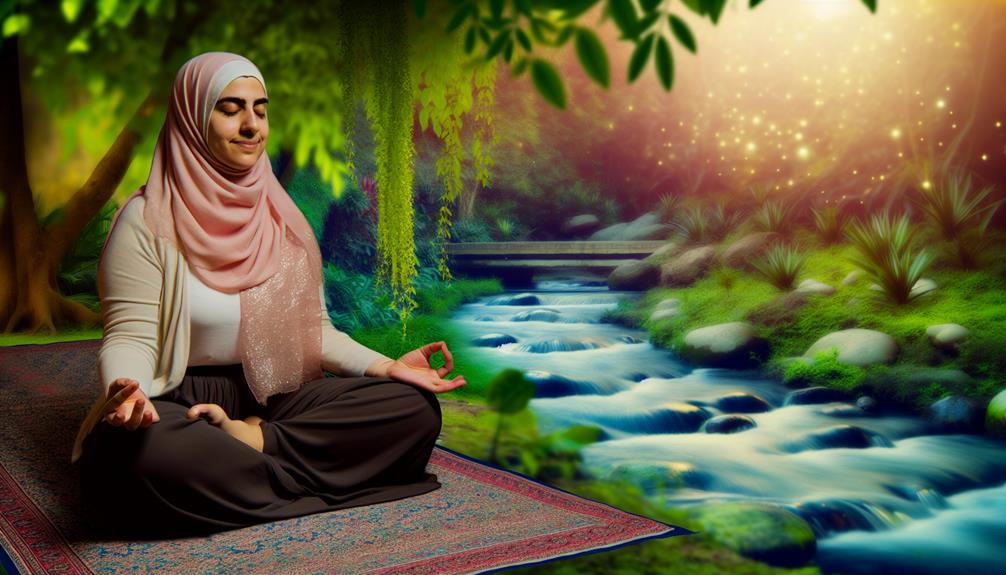If you're someone who often feels overwhelmed by the demands of daily life, you're not alone. Consider this scenario: Sarah, a working professional and mother of two, found herself constantly drained and unable to focus on her well-being. She often struggled with balancing her career, family, and personal needs, leading to a sense of burnout and exhaustion. However, there is a way to address these challenges and achieve a sense of balance. Embracing self-care with Lean Bliss offers a holistic approach that encompasses various facets of wellness, providing a roadmap to cultivate a healthier, more fulfilling lifestyle. The journey to holistic well-being begins with understanding the significance of self-care and how it can positively impact every aspect of your life.
Key Takeaways
- Self-care involves consciously prioritizing activities for physical and mental well-being, and it takes a holistic approach to overall well-being.
- Prioritizing self-care is important for maintaining mental and physical well-being, managing stress, and developing the ability to handle life's challenges.
- Self-care has mental health benefits, such as boosting mental health, reducing anxiety, enhancing emotional resilience, and maintaining connections with loved ones.
- Physical self-care involves maintaining overall well-being through physical activities, balanced diet, rest, and hydration, while emotional and mental self-care involves nourishing the body with a balanced diet, engaging in mindfulness practices, cultivating meaningful relationships, setting boundaries, and allocating time for self-care activities that bring joy and relaxation.
Defining Self-Care
Defining self-care is the act of consciously prioritizing activities that contribute to your physical and mental well-being. It involves taking a holistic approach to your overall well-being, encompassing both physical and mental health. When you engage in self-care, you are actively investing in your emotional well-being, mental health, and weight management. It is a personal commitment to nurturing and protecting your well-being, happiness, and health.
Self-care is not just about pampering yourself; it's a crucial practice for maintaining a balanced and fulfilling life. By incorporating regular self-care practices into your routine, you can effectively boost your physical health, protect yourself against potential health risks, and enhance your emotional well-being while reducing anxiety. It's about making time for activities that rejuvenate your mind and body, promoting a sense of well-rounded wellness.
Incorporating self-care into your daily life can have a profound impact on your overall well-being. It promotes productivity, increases work efficiency, and fosters self-love, sending a powerful message that you matter. By embracing self-care, you are embracing a lifestyle that prioritizes your mental and physical health, ultimately leading to a life of wellness and joy. It's an essential practice for anyone seeking to lead a balanced and fulfilling life.
Importance of Self-Care
Hey there! When it comes to self-care, it's not just about taking a bubble bath or getting a massage. It's about prioritizing your mental and physical well-being, and incorporating stress management techniques into your daily routine. By embracing self-care, you'll experience mental health benefits, improved physical health, and a better ability to handle life's challenges.
Mental Health Benefits
Regularly practicing self-care is crucial for boosting your mental health and reducing anxiety. Engaging in self-care practices has significant mental health benefits, contributing to your emotional and mental wellbeing. Taking time for self-care activities provides emotional support, helping you manage stress and cultivate a more positive outlook. By incorporating mindfulness and stress management techniques into your routine, you can enhance your emotional resilience and reduce the impact of daily stressors on your mental health. Additionally, maintaining connections with loved ones and setting boundaries for personal time are vital aspects of self-care that contribute to your emotional and mental wellbeing. Prioritizing self-care allows you to nurture a healthier mindset, promoting emotional balance and overall mental wellness.
Physical Well-Being
Ensuring proper physical self-care is essential for maintaining overall well-being and promoting a healthy lifestyle. Physical self-care plays a crucial role in your health, weight management, and overall well-being. Engaging in physical activities like walking, jogging, or yoga not only helps in weight management but also stabilizes blood sugar levels and improves insulin sensitivity. Nourishing your body with a balanced diet is vital for maintaining a healthy weight and promoting overall health. Additionally, prioritizing rest and ensuring you get enough sleep are essential for physical self-care and overall well-being. It's important to avoid relying solely on weight loss supplements and instead focus on nourishing your body to support its natural ability to manage stored fat. By embracing physical self-care, you can enhance your health and well-being.
Stress Management Techniques
After prioritizing physical well-being and nourishing your body with a balanced diet, it's important to recognize the significance of stress management techniques in promoting overall self-care and well-being. Stress management techniques play a crucial role in your self-care journey, ensuring emotional and mental well-being. Identifying stress triggers and practicing healthy coping strategies are essential for effectively managing stress. Engaging in activities like exercise, yoga, or guided meditation can significantly reduce stress levels and contribute to emotional self-care. It's important to set aside time for yourself, prioritizing self-care activities that boost emotional well-being and reduce anxiety. Building and nurturing meaningful relationships, setting boundaries, and participating in community activities are also vital for social self-care. Embracing mindfulness, nature, creative activities, and hobbies can further enhance spiritual and creative self-care practices.
Physical Self-Care
Taking care of your body involves respecting its needs and nourishing it with a balanced diet. Fueling your body with the right nutrients is essential for your wellness journey. A holistic approach to physical self-care includes nutrition, hydration, exercise, rest, and personal hygiene. Nourishing your body with a balanced diet provides the energy and essential nutrients needed for optimal functioning. Incorporating a variety of fruits, vegetables, lean proteins, and whole grains into your diet supports your body's needs. Staying hydrated is also crucial for overall wellness. Drinking an adequate amount of water daily helps in maintaining bodily functions and supports your weight loss journey.
Engaging in physical activities such as walking, jogging, or yoga promotes overall wellbeing. Finding an exercise routine that you enjoy can make it easier to stick to. It's not just about shedding excess weight but about feeling good and improving your overall health. Additionally, resting when required and ensuring you get enough sleep is crucial for physical self-care. Sleep is essential for your body to recover and rejuvenate. It is also important to maintain personal hygiene and body care routines as they contribute to physical well-being.
Emotional and Mental Self-Care

Nourishing your body with a balanced diet not only supports physical wellness but also plays a crucial role in maintaining emotional and mental well-being. Emotional and mental self-care is an integral part of a holistic approach to self-care. It involves various aspects that contribute to your overall well-being, including stress management, mindfulness, regular exercise, and connecting with loved ones.
- Mindfulness: Engaging in mindfulness and meditation practices can help you stay present and reduce stress and anxiety.
- Meaningful Relationships: Cultivating meaningful relationships and engaging in heartfelt conversations can provide a sense of connection and support.
- Setting Boundaries: Learning to set boundaries and prioritize your needs is essential for maintaining emotional and mental balance.
- Time for Self-Care: Allocating time for self-care activities that bring joy and relaxation is crucial for your emotional and mental well-being.
It's important to recognize and address emotional challenges that may arise during different life stages, such as during pregnancy and postpartum. Regular self-care practices not only enhance emotional well-being but also contribute to reduced anxiety and improved work efficiency. By integrating these elements into your self-care routine, you can nurture your emotional and mental health, leading to a more balanced and fulfilling life.
Social Self-Care
Engaging in social interactions and nurturing meaningful relationships is essential for practicing effective social self-care. Building and maintaining connections with friends and loved ones is crucial for your overall well-being. Friends provide emotional support, help you grow, and enrich your everyday life. However, it's equally important to set boundaries within your social life. Setting boundaries safeguards your energy and establishes clear lines of acceptable behavior, ensuring that your social interactions are positive and nurturing.
Practicing gratitude is another vital aspect of social self-care. Expressing gratitude not only improves your well-being but also strengthens your relationships and increases your overall happiness. Engaging in meaningful conversations is also beneficial. Meaningful conversations deepen connections and promote personal growth, allowing you to foster collaborative efforts within your social circles. Additionally, participating in community activities is an excellent way to practice social self-care. Community activities foster a sense of belonging, provide opportunities for personal growth, and promote social connections outside of your immediate circle of friends and loved ones.
While social media can play a role in social self-care, it's essential to use it mindfully. Ensure that your use of social media enhances your relationships and social interactions rather than detracting from them. By incorporating these practices into your social life, you can effectively nurture and care for your social well-being.
Spiritual Self-Care

Hey there! Ready to explore the realm of spiritual self-care? This involves nurturing your inner spirit and connection to something larger than yourself through practices like mindfulness and meditation. Engaging in spiritual self-care can bring a sense of purpose, inner peace, and a deeper connection to yourself and the world around you.
Inner Peace Practices
To achieve inner peace through spiritual self-care, consider engaging in mindfulness and meditation to calm your mind and connect with your inner self. Practicing mindfulness can help you feel more grounded and centered, while meditation allows you to quiet the mental chatter and find peace within. Connecting with nature is also essential in your journey towards inner peace. Spending time outdoors can provide solace, reduce stress, and rejuvenate your spirit. Additionally, practicing gratitude can cultivate a sense of inner peace and appreciation for life. Taking time to reflect on the things you are thankful for can shift your focus towards positivity. Finally, engaging in self-reflection is crucial when it comes to self-care. It allows you to gain clarity, self-awareness, and a deeper understanding of your inner world.
Mindfulness and Meditation
Embracing mindfulness and meditation as part of your spiritual self-care routine can profoundly enhance your inner peace and overall well-being. Mindfulness allows you to be present without judgment, fostering emotional balance and reducing stress. On the other hand, meditation clears the mind, enhances focus, and promotes mental well-being. These practices help in fostering a deeper connection with yourself and the world around you, leading to improved clarity, emotional resilience, and a sense of inner harmony. Furthermore, incorporating mindfulness and meditation into your holistic approach to self-care can also help in managing oxidative stress, promoting a healthy weight, and overall health. Making time for these practices in your daily routine can have far-reaching benefits for your spiritual, mental, and physical well-being.
Creative Self-Care
Engaging in artistic and expressive activities is a key component of creative self-care, fostering mindfulness, self-expression, and joy. Incorporating creative outlets into your self-care routine can have a profound impact on your overall well-being. Here's how you can integrate creative self-care into your daily life:
- Spending time on hobbies: Dedicate time to activities that bring you joy, whether it's painting, knitting, gardening, or playing a musical instrument. Engaging in hobbies allows you to unwind, express yourself, and tap into a sense of fulfillment.
- Exploring the outdoors: Take a walk, go for a hike, or simply sit in a park and soak up some fresh air. Connecting with nature can be a powerful form of creative self-care, inspiring new ideas and providing a mental refresh.
- Embracing spontaneity: Allow yourself to be playful and spontaneous. Whether it's trying out a new recipe, experimenting with a DIY project, or engaging in impromptu activities, embracing spontaneity can infuse your life with excitement and creativity.
- Treating yourself to a spa day: Pamper yourself with a spa day at home or at a professional spa. Indulging in relaxation and self-care treatments can make you feel good both physically and mentally, providing a rejuvenating experience.
Incorporating these practices into your routine can nurture your creative spirit, reduce stress, and enhance your emotional well-being. Creative self-care is about finding joy in self-expression and embracing the beauty of the present moment.
Practicing Self-Care: Tips and Techniques

When it comes to practicing self-care, it's essential to incorporate various techniques that cater to your physical, emotional, and social well-being. LeanBliss emphasizes a holistic approach, recognizing the interconnectedness of these aspects in your self-care journey. To start, consider implementing a few simple tips and techniques to enhance your self-care routine.
For physical self-care, prioritize regular exercise, nutritious meals, and adequate rest. LeanBliss encourages mindful movement, such as yoga or walking in nature, to promote physical well-being. Additionally, practicing deep breathing exercises can aid in stress management and contribute to your emotional self-care. Mindfulness techniques, like meditation or journaling, are also valuable tools for emotional well-being.
In terms of social self-care, LeanBliss suggests setting boundaries to protect your energy and fostering meaningful connections with supportive individuals. Engaging in regular social activities, whether it's a coffee date with a friend or joining a community group, can contribute positively to your overall well-being. Moreover, incorporating elements of spiritual and creative self-care, such as spending time in nature or pursuing a creative hobby, can further enrich your self-care journey.
Benefits of Holistic Self-Care
You can experience a range of benefits by incorporating holistic self-care into your daily routine. By taking a comprehensive approach to wellness, you address your physical, emotional, and social needs, which enhances your overall well-being. This comprehensive approach promotes inner balance and harmony, leading to improved mental and physical health. It also encourages self-discovery and personal growth, fostering a deeper connection with yourself. Moreover, holistic self-care reduces stress, anxiety, and burnout, leading to a more fulfilling and joyful life.
Incorporating holistic self-care into your routine can have specific benefits for your physical health. For example, Ceylon Cinnamon, known for its high levels of Corosolic acid, can help regulate blood sugar levels, aiding in weight loss and reducing the risk of diabetes. When you take care of your mind, body, and spirit, you may also notice a decrease in the side effects of stress and anxiety, such as headaches or stomach issues. This comprehensive approach to wellness ensures that you are nurturing all aspects of your being, leading to a more balanced and fulfilling life.
Frequently Asked Questions
Can Self-Care Practices Interfere With Religious or Spiritual Beliefs?
Self-care practices can complement your religious or spiritual beliefs. It's about finding balance and respecting cultural considerations. Set personal boundaries and incorporate mindfulness practices that align with your spirituality. Seeking guidance from spiritual leaders can help navigate any conflicts. Ultimately, self-care can enhance your spiritual connection and overall well-being. Remember, it's about honoring your beliefs while prioritizing your mental and physical health.
How Can Self-Care Be Incorporated Into a Busy Work Schedule?
Feeling overwhelmed with work? You're not alone. Studies show that 80% of people struggle to find time for self-care. But there's hope. Start by prioritizing tasks, allowing for breaks, and setting boundaries. Use mindfulness techniques, like deep breathing, to relieve stress. Incorporate short walks or stretching exercises into your day for personal wellness. By managing time effectively and practicing self-care, you can enhance mental health and productivity.
Is There a Connection Between Self-Care and Physical Fitness or Exercise Routines?
Yes, there's a strong connection between self-care and physical fitness. Engaging in exercise routines not only improves your physical health but also benefits your mental health, stress management, and emotional well-being. It's about the mind-body connection and achieving holistic wellness. Prioritizing your overall health through exercise can have a positive impact on your mental health, making it an essential aspect of self-care.
What Are Some Creative Self-Care Activities for Those Who Are Not Naturally Artistic?
If you're not naturally artistic, there are still plenty of creative self-care activities to explore. You can focus on mental wellness through mindfulness meditation or gentle yoga. Engaging in outdoor activities like hiking or gardening can also be a form of creative self-care. DIY projects such as crafting or cooking can be both relaxing and fulfilling. Connecting with nature, whether through walks or simply sitting outside, is another valuable self-care activity to consider.
How Does Self-Care Impact Relationships and Social Interactions With Others?
When you prioritize self-care, it sets a foundation for healthier relationships. Boundaries and communication improve, boosting emotional intelligence. Managing stress and nurturing mental well-being become easier. You become better equipped to offer social support and cultivate healthy relationships. Taking care of yourself positively impacts how you engage with others. It's like tending to a garden; when you nurture yourself, you're better able to nurture your relationships and interactions with others.
